Comprehensive Holistic Health Assessment Report for a Patient
VerifiedAdded on 2022/11/13
|9
|2360
|245
Report
AI Summary
This report presents a comprehensive holistic health assessment of a 65-year-old male patient, 'John,' admitted to the hospital with diabetes. The assessment encompasses various dimensions of his health, including physical, psychological, social, cultural, and spiritual aspects. The report details John's medical history, including diabetes, neuropathy, and asthma, along with his social and emotional background, marked by personal losses and loneliness. The psychological assessment reveals symptoms of depression and mental distress. Social and cultural assessments highlight the patient's isolation and spiritual beliefs. The report concludes with a hypothesis suggesting potential psychological disorders and provides recommendations for improving John's health, including counseling, medication management, and lifestyle adjustments to manage stress and improve his overall well-being. The assessment emphasizes the importance of a holistic approach to patient care, addressing not only physical ailments but also the emotional, social, and spiritual factors that influence health outcomes.
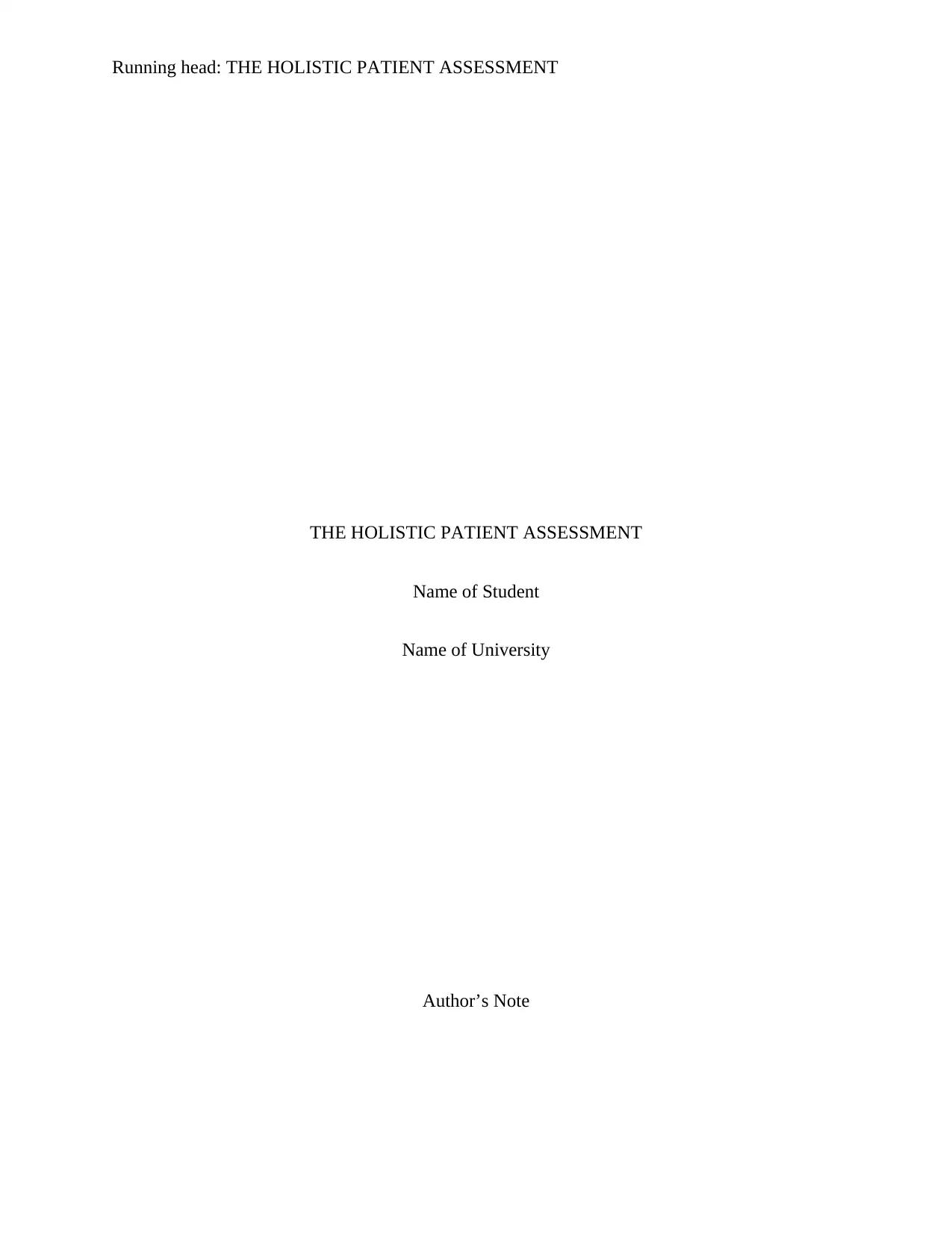
Running head: THE HOLISTIC PATIENT ASSESSMENT
THE HOLISTIC PATIENT ASSESSMENT
Name of Student
Name of University
Author’s Note
THE HOLISTIC PATIENT ASSESSMENT
Name of Student
Name of University
Author’s Note
Paraphrase This Document
Need a fresh take? Get an instant paraphrase of this document with our AI Paraphraser
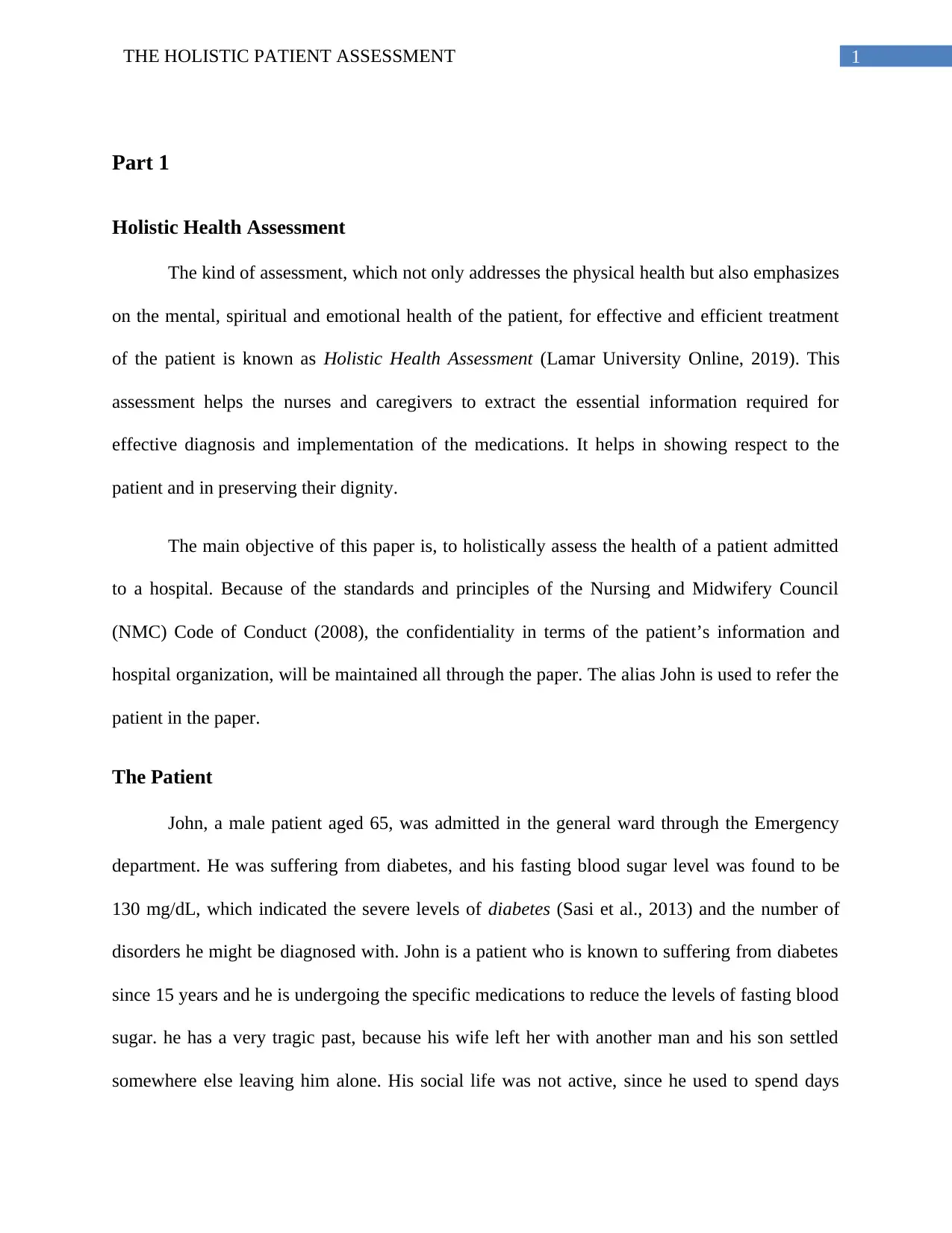
1THE HOLISTIC PATIENT ASSESSMENT
Part 1
Holistic Health Assessment
The kind of assessment, which not only addresses the physical health but also emphasizes
on the mental, spiritual and emotional health of the patient, for effective and efficient treatment
of the patient is known as Holistic Health Assessment (Lamar University Online, 2019). This
assessment helps the nurses and caregivers to extract the essential information required for
effective diagnosis and implementation of the medications. It helps in showing respect to the
patient and in preserving their dignity.
The main objective of this paper is, to holistically assess the health of a patient admitted
to a hospital. Because of the standards and principles of the Nursing and Midwifery Council
(NMC) Code of Conduct (2008), the confidentiality in terms of the patient’s information and
hospital organization, will be maintained all through the paper. The alias John is used to refer the
patient in the paper.
The Patient
John, a male patient aged 65, was admitted in the general ward through the Emergency
department. He was suffering from diabetes, and his fasting blood sugar level was found to be
130 mg/dL, which indicated the severe levels of diabetes (Sasi et al., 2013) and the number of
disorders he might be diagnosed with. John is a patient who is known to suffering from diabetes
since 15 years and he is undergoing the specific medications to reduce the levels of fasting blood
sugar. he has a very tragic past, because his wife left her with another man and his son settled
somewhere else leaving him alone. His social life was not active, since he used to spend days
Part 1
Holistic Health Assessment
The kind of assessment, which not only addresses the physical health but also emphasizes
on the mental, spiritual and emotional health of the patient, for effective and efficient treatment
of the patient is known as Holistic Health Assessment (Lamar University Online, 2019). This
assessment helps the nurses and caregivers to extract the essential information required for
effective diagnosis and implementation of the medications. It helps in showing respect to the
patient and in preserving their dignity.
The main objective of this paper is, to holistically assess the health of a patient admitted
to a hospital. Because of the standards and principles of the Nursing and Midwifery Council
(NMC) Code of Conduct (2008), the confidentiality in terms of the patient’s information and
hospital organization, will be maintained all through the paper. The alias John is used to refer the
patient in the paper.
The Patient
John, a male patient aged 65, was admitted in the general ward through the Emergency
department. He was suffering from diabetes, and his fasting blood sugar level was found to be
130 mg/dL, which indicated the severe levels of diabetes (Sasi et al., 2013) and the number of
disorders he might be diagnosed with. John is a patient who is known to suffering from diabetes
since 15 years and he is undergoing the specific medications to reduce the levels of fasting blood
sugar. he has a very tragic past, because his wife left her with another man and his son settled
somewhere else leaving him alone. His social life was not active, since he used to spend days
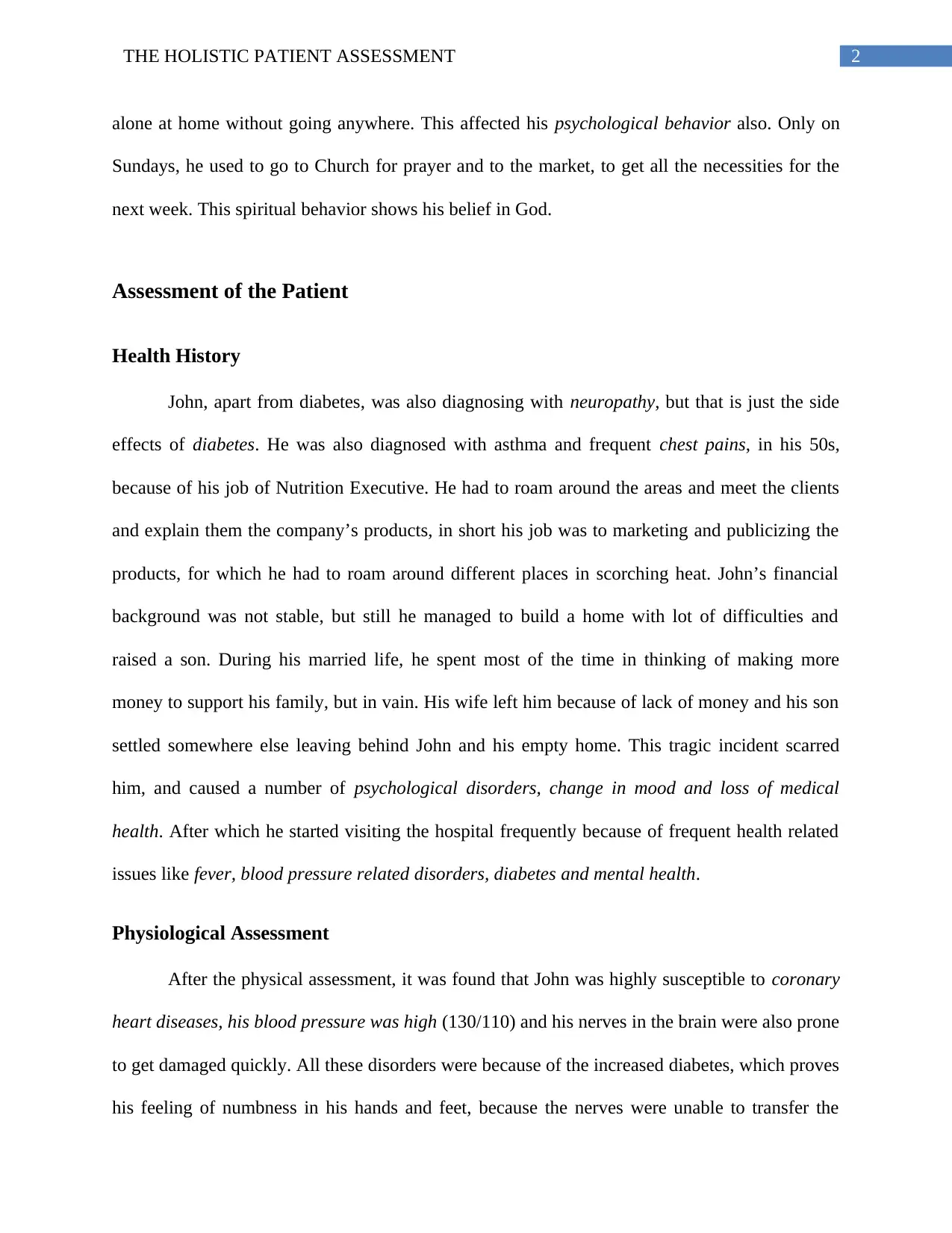
2THE HOLISTIC PATIENT ASSESSMENT
alone at home without going anywhere. This affected his psychological behavior also. Only on
Sundays, he used to go to Church for prayer and to the market, to get all the necessities for the
next week. This spiritual behavior shows his belief in God.
Assessment of the Patient
Health History
John, apart from diabetes, was also diagnosing with neuropathy, but that is just the side
effects of diabetes. He was also diagnosed with asthma and frequent chest pains, in his 50s,
because of his job of Nutrition Executive. He had to roam around the areas and meet the clients
and explain them the company’s products, in short his job was to marketing and publicizing the
products, for which he had to roam around different places in scorching heat. John’s financial
background was not stable, but still he managed to build a home with lot of difficulties and
raised a son. During his married life, he spent most of the time in thinking of making more
money to support his family, but in vain. His wife left him because of lack of money and his son
settled somewhere else leaving behind John and his empty home. This tragic incident scarred
him, and caused a number of psychological disorders, change in mood and loss of medical
health. After which he started visiting the hospital frequently because of frequent health related
issues like fever, blood pressure related disorders, diabetes and mental health.
Physiological Assessment
After the physical assessment, it was found that John was highly susceptible to coronary
heart diseases, his blood pressure was high (130/110) and his nerves in the brain were also prone
to get damaged quickly. All these disorders were because of the increased diabetes, which proves
his feeling of numbness in his hands and feet, because the nerves were unable to transfer the
alone at home without going anywhere. This affected his psychological behavior also. Only on
Sundays, he used to go to Church for prayer and to the market, to get all the necessities for the
next week. This spiritual behavior shows his belief in God.
Assessment of the Patient
Health History
John, apart from diabetes, was also diagnosing with neuropathy, but that is just the side
effects of diabetes. He was also diagnosed with asthma and frequent chest pains, in his 50s,
because of his job of Nutrition Executive. He had to roam around the areas and meet the clients
and explain them the company’s products, in short his job was to marketing and publicizing the
products, for which he had to roam around different places in scorching heat. John’s financial
background was not stable, but still he managed to build a home with lot of difficulties and
raised a son. During his married life, he spent most of the time in thinking of making more
money to support his family, but in vain. His wife left him because of lack of money and his son
settled somewhere else leaving behind John and his empty home. This tragic incident scarred
him, and caused a number of psychological disorders, change in mood and loss of medical
health. After which he started visiting the hospital frequently because of frequent health related
issues like fever, blood pressure related disorders, diabetes and mental health.
Physiological Assessment
After the physical assessment, it was found that John was highly susceptible to coronary
heart diseases, his blood pressure was high (130/110) and his nerves in the brain were also prone
to get damaged quickly. All these disorders were because of the increased diabetes, which proves
his feeling of numbness in his hands and feet, because the nerves were unable to transfer the
⊘ This is a preview!⊘
Do you want full access?
Subscribe today to unlock all pages.

Trusted by 1+ million students worldwide
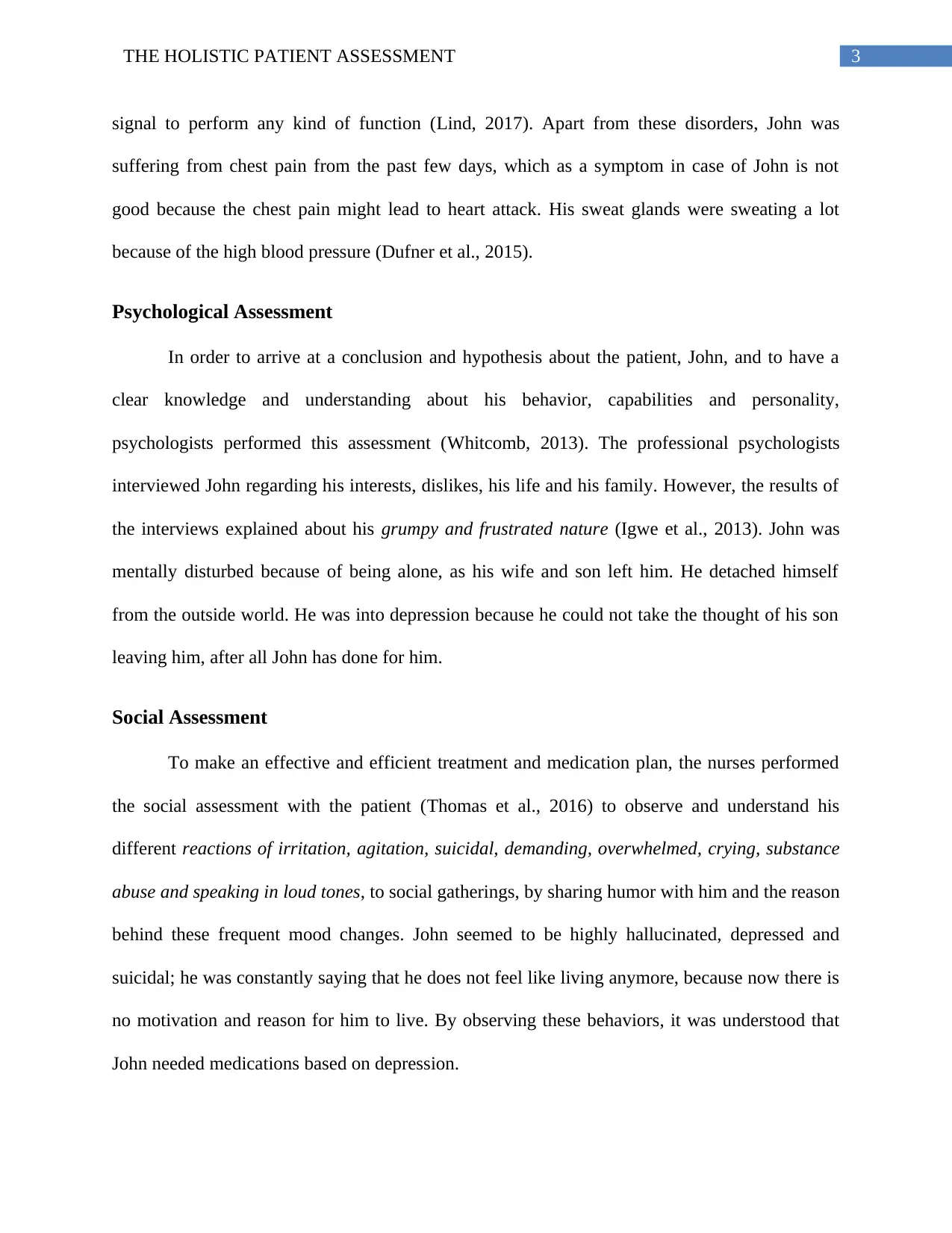
3THE HOLISTIC PATIENT ASSESSMENT
signal to perform any kind of function (Lind, 2017). Apart from these disorders, John was
suffering from chest pain from the past few days, which as a symptom in case of John is not
good because the chest pain might lead to heart attack. His sweat glands were sweating a lot
because of the high blood pressure (Dufner et al., 2015).
Psychological Assessment
In order to arrive at a conclusion and hypothesis about the patient, John, and to have a
clear knowledge and understanding about his behavior, capabilities and personality,
psychologists performed this assessment (Whitcomb, 2013). The professional psychologists
interviewed John regarding his interests, dislikes, his life and his family. However, the results of
the interviews explained about his grumpy and frustrated nature (Igwe et al., 2013). John was
mentally disturbed because of being alone, as his wife and son left him. He detached himself
from the outside world. He was into depression because he could not take the thought of his son
leaving him, after all John has done for him.
Social Assessment
To make an effective and efficient treatment and medication plan, the nurses performed
the social assessment with the patient (Thomas et al., 2016) to observe and understand his
different reactions of irritation, agitation, suicidal, demanding, overwhelmed, crying, substance
abuse and speaking in loud tones, to social gatherings, by sharing humor with him and the reason
behind these frequent mood changes. John seemed to be highly hallucinated, depressed and
suicidal; he was constantly saying that he does not feel like living anymore, because now there is
no motivation and reason for him to live. By observing these behaviors, it was understood that
John needed medications based on depression.
signal to perform any kind of function (Lind, 2017). Apart from these disorders, John was
suffering from chest pain from the past few days, which as a symptom in case of John is not
good because the chest pain might lead to heart attack. His sweat glands were sweating a lot
because of the high blood pressure (Dufner et al., 2015).
Psychological Assessment
In order to arrive at a conclusion and hypothesis about the patient, John, and to have a
clear knowledge and understanding about his behavior, capabilities and personality,
psychologists performed this assessment (Whitcomb, 2013). The professional psychologists
interviewed John regarding his interests, dislikes, his life and his family. However, the results of
the interviews explained about his grumpy and frustrated nature (Igwe et al., 2013). John was
mentally disturbed because of being alone, as his wife and son left him. He detached himself
from the outside world. He was into depression because he could not take the thought of his son
leaving him, after all John has done for him.
Social Assessment
To make an effective and efficient treatment and medication plan, the nurses performed
the social assessment with the patient (Thomas et al., 2016) to observe and understand his
different reactions of irritation, agitation, suicidal, demanding, overwhelmed, crying, substance
abuse and speaking in loud tones, to social gatherings, by sharing humor with him and the reason
behind these frequent mood changes. John seemed to be highly hallucinated, depressed and
suicidal; he was constantly saying that he does not feel like living anymore, because now there is
no motivation and reason for him to live. By observing these behaviors, it was understood that
John needed medications based on depression.
Paraphrase This Document
Need a fresh take? Get an instant paraphrase of this document with our AI Paraphraser
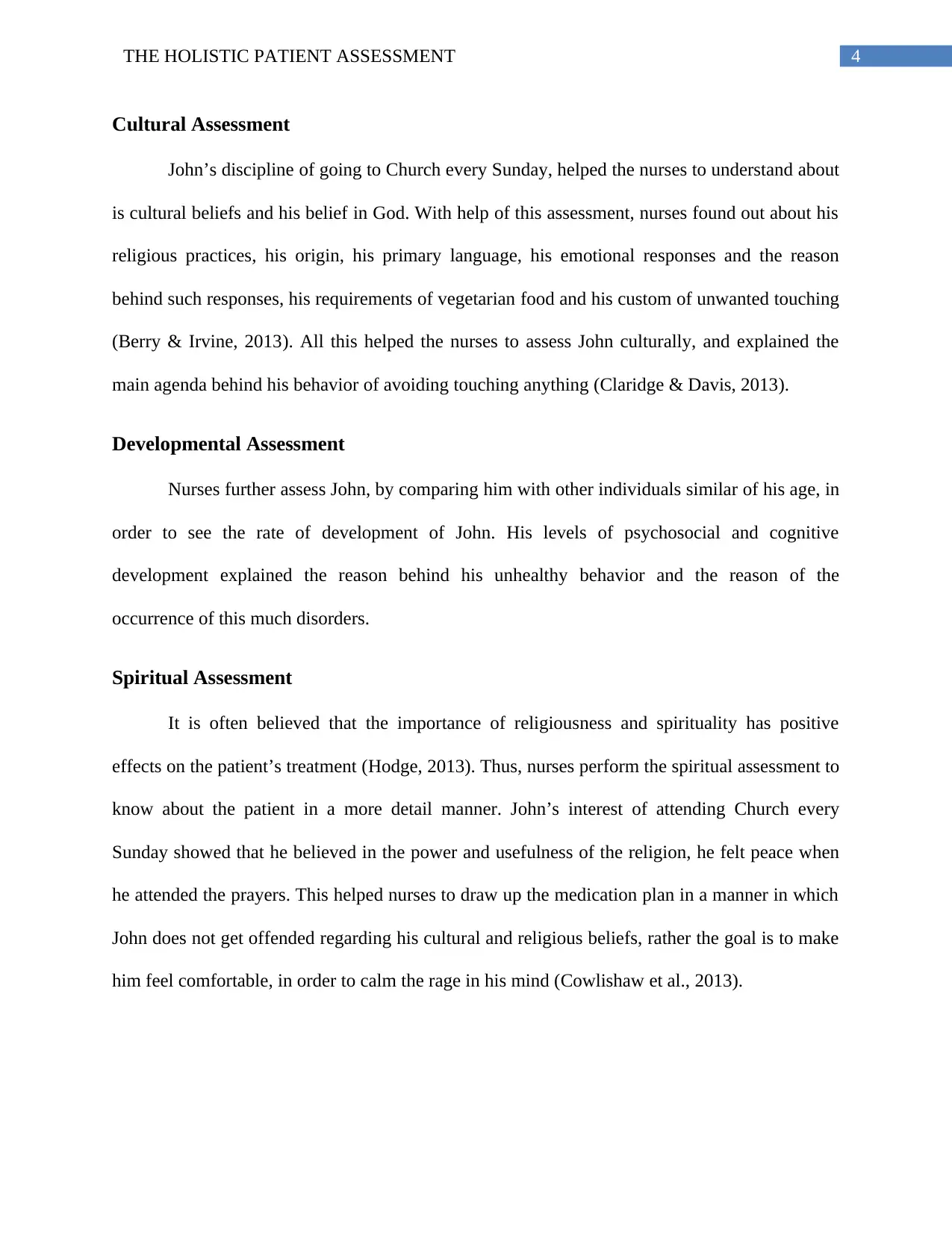
4THE HOLISTIC PATIENT ASSESSMENT
Cultural Assessment
John’s discipline of going to Church every Sunday, helped the nurses to understand about
is cultural beliefs and his belief in God. With help of this assessment, nurses found out about his
religious practices, his origin, his primary language, his emotional responses and the reason
behind such responses, his requirements of vegetarian food and his custom of unwanted touching
(Berry & Irvine, 2013). All this helped the nurses to assess John culturally, and explained the
main agenda behind his behavior of avoiding touching anything (Claridge & Davis, 2013).
Developmental Assessment
Nurses further assess John, by comparing him with other individuals similar of his age, in
order to see the rate of development of John. His levels of psychosocial and cognitive
development explained the reason behind his unhealthy behavior and the reason of the
occurrence of this much disorders.
Spiritual Assessment
It is often believed that the importance of religiousness and spirituality has positive
effects on the patient’s treatment (Hodge, 2013). Thus, nurses perform the spiritual assessment to
know about the patient in a more detail manner. John’s interest of attending Church every
Sunday showed that he believed in the power and usefulness of the religion, he felt peace when
he attended the prayers. This helped nurses to draw up the medication plan in a manner in which
John does not get offended regarding his cultural and religious beliefs, rather the goal is to make
him feel comfortable, in order to calm the rage in his mind (Cowlishaw et al., 2013).
Cultural Assessment
John’s discipline of going to Church every Sunday, helped the nurses to understand about
is cultural beliefs and his belief in God. With help of this assessment, nurses found out about his
religious practices, his origin, his primary language, his emotional responses and the reason
behind such responses, his requirements of vegetarian food and his custom of unwanted touching
(Berry & Irvine, 2013). All this helped the nurses to assess John culturally, and explained the
main agenda behind his behavior of avoiding touching anything (Claridge & Davis, 2013).
Developmental Assessment
Nurses further assess John, by comparing him with other individuals similar of his age, in
order to see the rate of development of John. His levels of psychosocial and cognitive
development explained the reason behind his unhealthy behavior and the reason of the
occurrence of this much disorders.
Spiritual Assessment
It is often believed that the importance of religiousness and spirituality has positive
effects on the patient’s treatment (Hodge, 2013). Thus, nurses perform the spiritual assessment to
know about the patient in a more detail manner. John’s interest of attending Church every
Sunday showed that he believed in the power and usefulness of the religion, he felt peace when
he attended the prayers. This helped nurses to draw up the medication plan in a manner in which
John does not get offended regarding his cultural and religious beliefs, rather the goal is to make
him feel comfortable, in order to calm the rage in his mind (Cowlishaw et al., 2013).
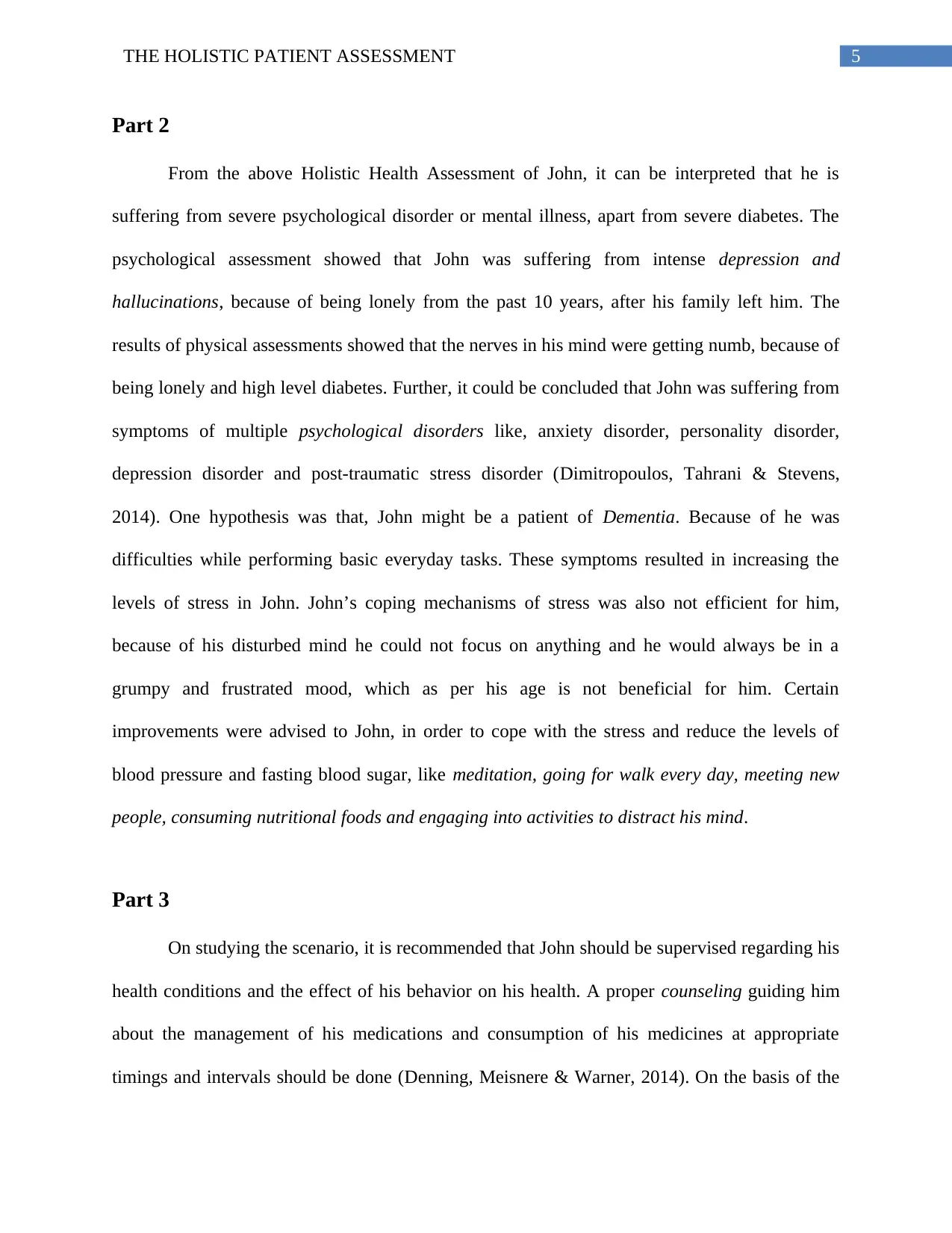
5THE HOLISTIC PATIENT ASSESSMENT
Part 2
From the above Holistic Health Assessment of John, it can be interpreted that he is
suffering from severe psychological disorder or mental illness, apart from severe diabetes. The
psychological assessment showed that John was suffering from intense depression and
hallucinations, because of being lonely from the past 10 years, after his family left him. The
results of physical assessments showed that the nerves in his mind were getting numb, because of
being lonely and high level diabetes. Further, it could be concluded that John was suffering from
symptoms of multiple psychological disorders like, anxiety disorder, personality disorder,
depression disorder and post-traumatic stress disorder (Dimitropoulos, Tahrani & Stevens,
2014). One hypothesis was that, John might be a patient of Dementia. Because of he was
difficulties while performing basic everyday tasks. These symptoms resulted in increasing the
levels of stress in John. John’s coping mechanisms of stress was also not efficient for him,
because of his disturbed mind he could not focus on anything and he would always be in a
grumpy and frustrated mood, which as per his age is not beneficial for him. Certain
improvements were advised to John, in order to cope with the stress and reduce the levels of
blood pressure and fasting blood sugar, like meditation, going for walk every day, meeting new
people, consuming nutritional foods and engaging into activities to distract his mind.
Part 3
On studying the scenario, it is recommended that John should be supervised regarding his
health conditions and the effect of his behavior on his health. A proper counseling guiding him
about the management of his medications and consumption of his medicines at appropriate
timings and intervals should be done (Denning, Meisnere & Warner, 2014). On the basis of the
Part 2
From the above Holistic Health Assessment of John, it can be interpreted that he is
suffering from severe psychological disorder or mental illness, apart from severe diabetes. The
psychological assessment showed that John was suffering from intense depression and
hallucinations, because of being lonely from the past 10 years, after his family left him. The
results of physical assessments showed that the nerves in his mind were getting numb, because of
being lonely and high level diabetes. Further, it could be concluded that John was suffering from
symptoms of multiple psychological disorders like, anxiety disorder, personality disorder,
depression disorder and post-traumatic stress disorder (Dimitropoulos, Tahrani & Stevens,
2014). One hypothesis was that, John might be a patient of Dementia. Because of he was
difficulties while performing basic everyday tasks. These symptoms resulted in increasing the
levels of stress in John. John’s coping mechanisms of stress was also not efficient for him,
because of his disturbed mind he could not focus on anything and he would always be in a
grumpy and frustrated mood, which as per his age is not beneficial for him. Certain
improvements were advised to John, in order to cope with the stress and reduce the levels of
blood pressure and fasting blood sugar, like meditation, going for walk every day, meeting new
people, consuming nutritional foods and engaging into activities to distract his mind.
Part 3
On studying the scenario, it is recommended that John should be supervised regarding his
health conditions and the effect of his behavior on his health. A proper counseling guiding him
about the management of his medications and consumption of his medicines at appropriate
timings and intervals should be done (Denning, Meisnere & Warner, 2014). On the basis of the
⊘ This is a preview!⊘
Do you want full access?
Subscribe today to unlock all pages.

Trusted by 1+ million students worldwide
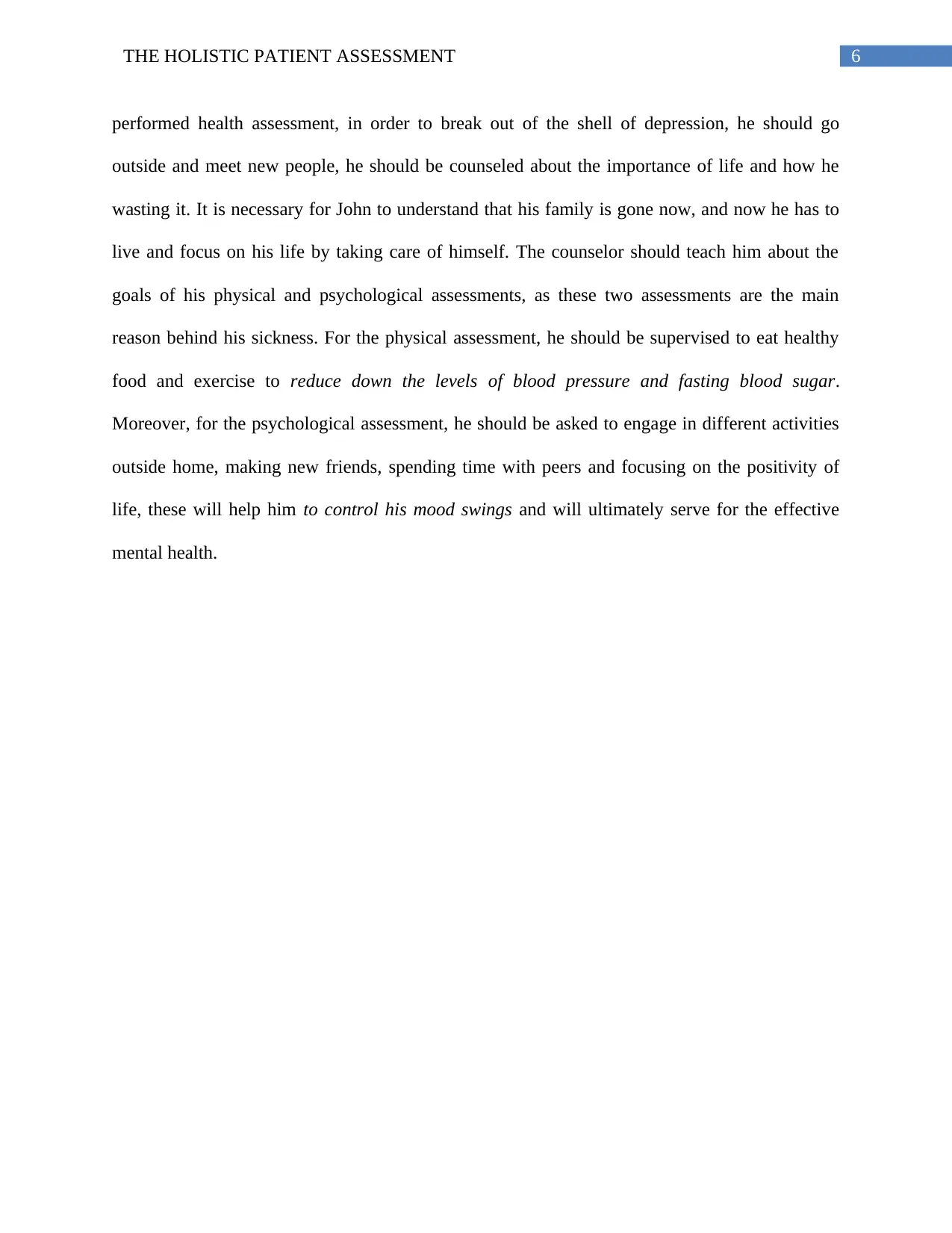
6THE HOLISTIC PATIENT ASSESSMENT
performed health assessment, in order to break out of the shell of depression, he should go
outside and meet new people, he should be counseled about the importance of life and how he
wasting it. It is necessary for John to understand that his family is gone now, and now he has to
live and focus on his life by taking care of himself. The counselor should teach him about the
goals of his physical and psychological assessments, as these two assessments are the main
reason behind his sickness. For the physical assessment, he should be supervised to eat healthy
food and exercise to reduce down the levels of blood pressure and fasting blood sugar.
Moreover, for the psychological assessment, he should be asked to engage in different activities
outside home, making new friends, spending time with peers and focusing on the positivity of
life, these will help him to control his mood swings and will ultimately serve for the effective
mental health.
performed health assessment, in order to break out of the shell of depression, he should go
outside and meet new people, he should be counseled about the importance of life and how he
wasting it. It is necessary for John to understand that his family is gone now, and now he has to
live and focus on his life by taking care of himself. The counselor should teach him about the
goals of his physical and psychological assessments, as these two assessments are the main
reason behind his sickness. For the physical assessment, he should be supervised to eat healthy
food and exercise to reduce down the levels of blood pressure and fasting blood sugar.
Moreover, for the psychological assessment, he should be asked to engage in different activities
outside home, making new friends, spending time with peers and focusing on the positivity of
life, these will help him to control his mood swings and will ultimately serve for the effective
mental health.
Paraphrase This Document
Need a fresh take? Get an instant paraphrase of this document with our AI Paraphraser
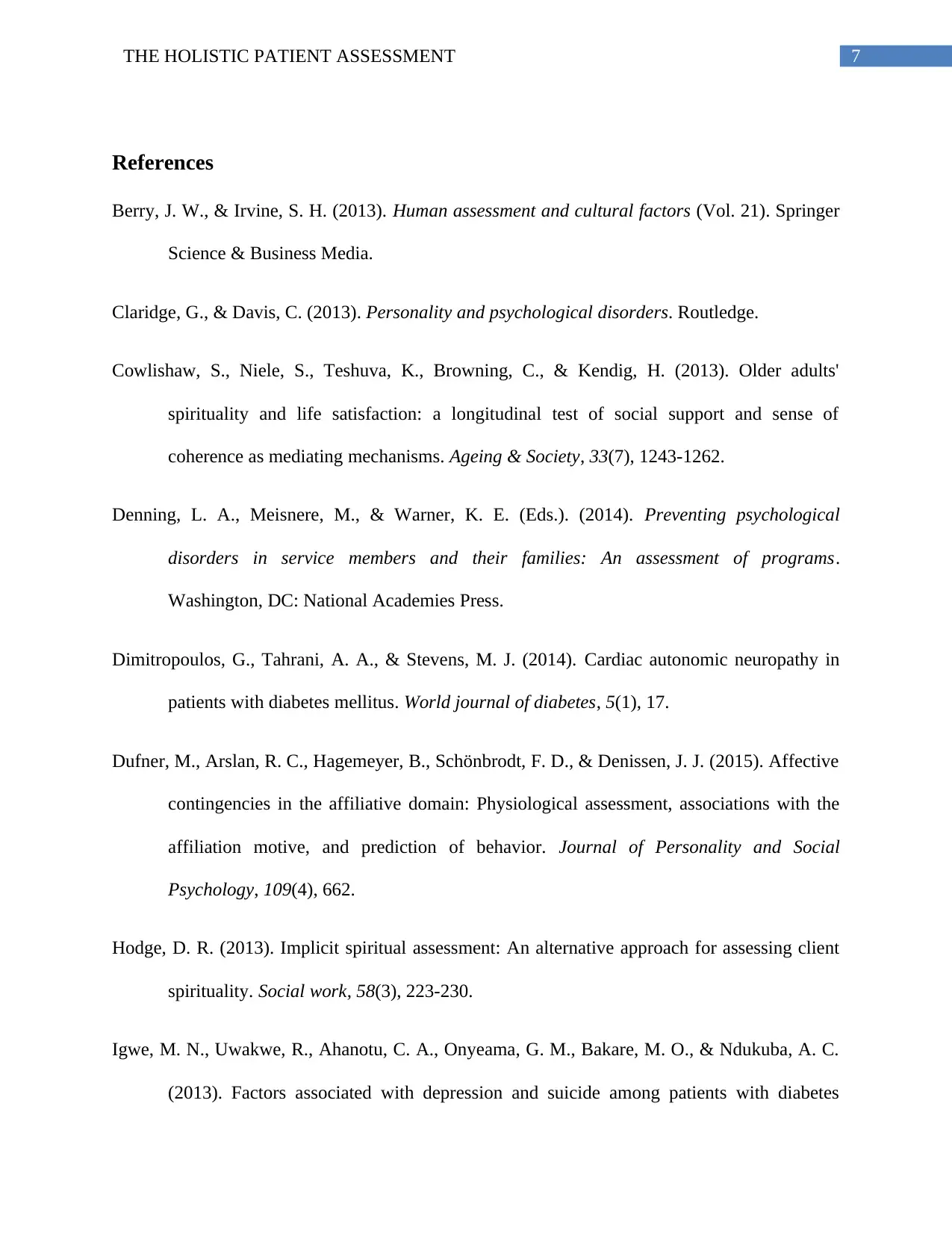
7THE HOLISTIC PATIENT ASSESSMENT
References
Berry, J. W., & Irvine, S. H. (2013). Human assessment and cultural factors (Vol. 21). Springer
Science & Business Media.
Claridge, G., & Davis, C. (2013). Personality and psychological disorders. Routledge.
Cowlishaw, S., Niele, S., Teshuva, K., Browning, C., & Kendig, H. (2013). Older adults'
spirituality and life satisfaction: a longitudinal test of social support and sense of
coherence as mediating mechanisms. Ageing & Society, 33(7), 1243-1262.
Denning, L. A., Meisnere, M., & Warner, K. E. (Eds.). (2014). Preventing psychological
disorders in service members and their families: An assessment of programs.
Washington, DC: National Academies Press.
Dimitropoulos, G., Tahrani, A. A., & Stevens, M. J. (2014). Cardiac autonomic neuropathy in
patients with diabetes mellitus. World journal of diabetes, 5(1), 17.
Dufner, M., Arslan, R. C., Hagemeyer, B., Schönbrodt, F. D., & Denissen, J. J. (2015). Affective
contingencies in the affiliative domain: Physiological assessment, associations with the
affiliation motive, and prediction of behavior. Journal of Personality and Social
Psychology, 109(4), 662.
Hodge, D. R. (2013). Implicit spiritual assessment: An alternative approach for assessing client
spirituality. Social work, 58(3), 223-230.
Igwe, M. N., Uwakwe, R., Ahanotu, C. A., Onyeama, G. M., Bakare, M. O., & Ndukuba, A. C.
(2013). Factors associated with depression and suicide among patients with diabetes
References
Berry, J. W., & Irvine, S. H. (2013). Human assessment and cultural factors (Vol. 21). Springer
Science & Business Media.
Claridge, G., & Davis, C. (2013). Personality and psychological disorders. Routledge.
Cowlishaw, S., Niele, S., Teshuva, K., Browning, C., & Kendig, H. (2013). Older adults'
spirituality and life satisfaction: a longitudinal test of social support and sense of
coherence as mediating mechanisms. Ageing & Society, 33(7), 1243-1262.
Denning, L. A., Meisnere, M., & Warner, K. E. (Eds.). (2014). Preventing psychological
disorders in service members and their families: An assessment of programs.
Washington, DC: National Academies Press.
Dimitropoulos, G., Tahrani, A. A., & Stevens, M. J. (2014). Cardiac autonomic neuropathy in
patients with diabetes mellitus. World journal of diabetes, 5(1), 17.
Dufner, M., Arslan, R. C., Hagemeyer, B., Schönbrodt, F. D., & Denissen, J. J. (2015). Affective
contingencies in the affiliative domain: Physiological assessment, associations with the
affiliation motive, and prediction of behavior. Journal of Personality and Social
Psychology, 109(4), 662.
Hodge, D. R. (2013). Implicit spiritual assessment: An alternative approach for assessing client
spirituality. Social work, 58(3), 223-230.
Igwe, M. N., Uwakwe, R., Ahanotu, C. A., Onyeama, G. M., Bakare, M. O., & Ndukuba, A. C.
(2013). Factors associated with depression and suicide among patients with diabetes
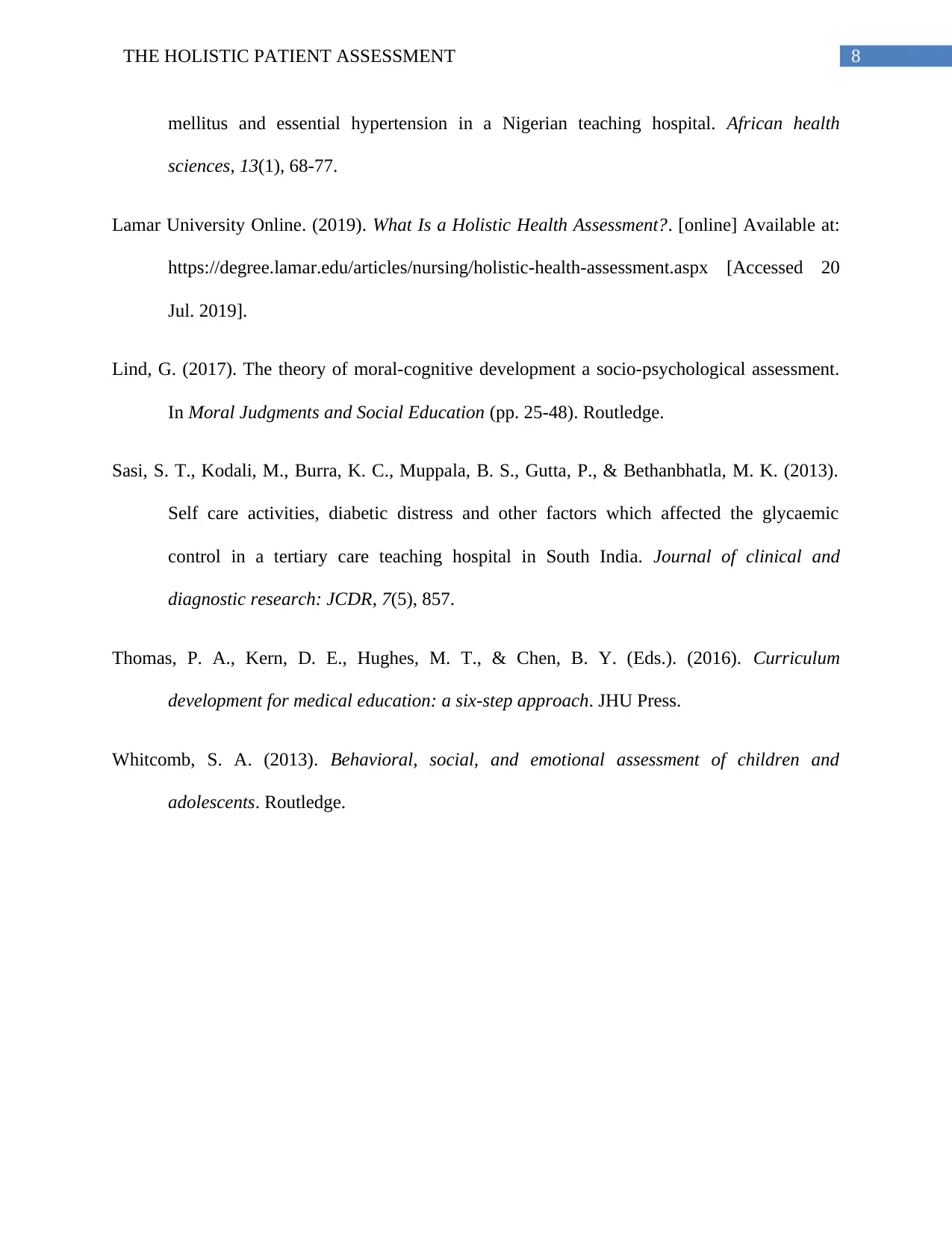
8THE HOLISTIC PATIENT ASSESSMENT
mellitus and essential hypertension in a Nigerian teaching hospital. African health
sciences, 13(1), 68-77.
Lamar University Online. (2019). What Is a Holistic Health Assessment?. [online] Available at:
https://degree.lamar.edu/articles/nursing/holistic-health-assessment.aspx [Accessed 20
Jul. 2019].
Lind, G. (2017). The theory of moral-cognitive development a socio-psychological assessment.
In Moral Judgments and Social Education (pp. 25-48). Routledge.
Sasi, S. T., Kodali, M., Burra, K. C., Muppala, B. S., Gutta, P., & Bethanbhatla, M. K. (2013).
Self care activities, diabetic distress and other factors which affected the glycaemic
control in a tertiary care teaching hospital in South India. Journal of clinical and
diagnostic research: JCDR, 7(5), 857.
Thomas, P. A., Kern, D. E., Hughes, M. T., & Chen, B. Y. (Eds.). (2016). Curriculum
development for medical education: a six-step approach. JHU Press.
Whitcomb, S. A. (2013). Behavioral, social, and emotional assessment of children and
adolescents. Routledge.
mellitus and essential hypertension in a Nigerian teaching hospital. African health
sciences, 13(1), 68-77.
Lamar University Online. (2019). What Is a Holistic Health Assessment?. [online] Available at:
https://degree.lamar.edu/articles/nursing/holistic-health-assessment.aspx [Accessed 20
Jul. 2019].
Lind, G. (2017). The theory of moral-cognitive development a socio-psychological assessment.
In Moral Judgments and Social Education (pp. 25-48). Routledge.
Sasi, S. T., Kodali, M., Burra, K. C., Muppala, B. S., Gutta, P., & Bethanbhatla, M. K. (2013).
Self care activities, diabetic distress and other factors which affected the glycaemic
control in a tertiary care teaching hospital in South India. Journal of clinical and
diagnostic research: JCDR, 7(5), 857.
Thomas, P. A., Kern, D. E., Hughes, M. T., & Chen, B. Y. (Eds.). (2016). Curriculum
development for medical education: a six-step approach. JHU Press.
Whitcomb, S. A. (2013). Behavioral, social, and emotional assessment of children and
adolescents. Routledge.
⊘ This is a preview!⊘
Do you want full access?
Subscribe today to unlock all pages.

Trusted by 1+ million students worldwide
1 out of 9
Related Documents
Your All-in-One AI-Powered Toolkit for Academic Success.
+13062052269
info@desklib.com
Available 24*7 on WhatsApp / Email
![[object Object]](/_next/static/media/star-bottom.7253800d.svg)
Unlock your academic potential
Copyright © 2020–2025 A2Z Services. All Rights Reserved. Developed and managed by ZUCOL.





